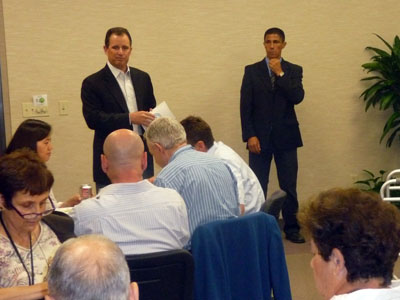
By Donald H. Harrison

SAN DIEGO – Israel’s first Bedouin Arab diplomat, Ishmael Khaldi, said on Thursday that the granting of American asylum to Mosab Hassan Yousef points up that Palestinians in Gaza are far from universally favorable to Hamas, the terrorist organization that has ruled the territory since 2006.
Yousef, 32, son of Sheikh Hassan Yousef who was one of the co-founders with Sheikh Ahmed Yassin of the Islamist organization that now rules Gaza, was granted asylum by Immigration Court Judge Richard Bartolomei on Wednesday after the Department of Homeland Security dropped its opposition to allowing him to stay in the United States. His former Shin-Bet handler, Gonen Ben Itzhak, broke his cover to corroborate Yousef’s story of having served as an undercover agent for Israel.
Sheikh Yousef, who is being held in an Israeli jail, has disowned his son, who authored the book , Son of Hamas, describing his life that included spying for Israel and converting to Christianity. Among information he had provided to the Shin Bet was the identity of the terrorists responsible for bombing the cafeteria at Hebrew University in 2002 in which San Diego student Marla Ann Bennett, was one of the nine persons murdered. Yousef also was credited with thwarting plots to assassinate Shimon Peres, now Israel’s President, and Sephardic Rabbi Ovadia Yosef.
Khaldi, a Muslim who now works as a policy advisor to Israel’s Foreign Minister Avigdor Lieberman, said the case of the younger Yousef is evidence that “the problem is not the people in Gaza, the problem is the regime.” He told a luncheon meeting of the Jewish Federation that the “vast majority of Palestinians in Gaza” want to be able to get up in the morning and go to jobs in Israel in such fields as construction, restaurants and farming in order to earn money to feed their children.
“I think the change has to come and will come only from this society, only from the citizens who stand up and speak up,” he added.
Prior to his current position, Khaldi had served as Israel’s deputy consul in San Francisco, and before that served as a spokesman to Arab media during Israel’s withdrawal from Gaza. Even before that, while with the Israel Defense Forces, he served as interpreter in discussions in 1998 between President Bill Clinton and PLO Chairman Yasser Arafat.
Recalling that after meeting with Arafat and a touring Gaza, President Clinton authorized the disbursal of $200 million in U.S. foreign aid funds for an orphanage in Gaza. The problem was that neither that money, nor money contributed by other countries, went to the orphanage or other such services; instead, it wound up in private bank accounts of Arafat and other PLO officials in Europe. That corruption on the part of Arafat’s Fatah party and other PLO officials was what prompted Gaza residents in the 2006 elections to elect Hamas in protest.
While not as corrupt as the PLO, Hamas declined Israel’s three conditions to participate in Palestinian independence negotiations: recognition of Israel, a cessation of anti-Israel incitement among its populace, and agreement to abide by previous agreements between Israel and the Palestinian Authority.
Khaldi, who tells his own life story in A Shepherd’s Journey, previewed his book in his talk at the Federation, mixing into his lecture such Yiddish words as “macher (expert)” and “yenta (talkative old lady)” with quotations from Arab sources, such as the proverb “I will make him my breakfast before he makes me his lunch” and the Koranic teaching “Don’t argue with the People of the Book (that is, Jews and Christians), but by the best means.” He said the “best means” for Muslims who have differences with Jews is not conflict, but peaceful negotiations.
Khaldi grew up in a small village of tents without electricity or running water, and walked to another village in the Galilee to attend school. As a relatively young man, he visited New York City with little preparation for life in a big city, returning to Israel after three months. He earned his bachelor’s degree at the University of Haifa and a master’s degree at Tel Aviv University en route to his diplomatic career.
The diplomat said he is often asked how he as a Muslim can speak in behalf of Israel. Those who know Bedouin history should not be surprised. A minority within the Arab minority in Israel, Bedouins (like the Druze) have learned to live and cooperate with the Israeli Jews. He said his grandmother’s generation welcomed and worked with Israeli pioneers who came to his area of the Galilee during the 1930s and added that many people don’t know that some Bedouins served in the Palmach and in the Haganah before the creation of the Israeli state.
Khaldi said since Israel’s independence in 1948 and especially since the Oslo Accords of 1993, Israel has “tried to do everything possible” to achieve peace with the Palestinians, whether the governments were of the left or the right in orientation. However, owing to conditions on the Palestinian side, including the split in leadership between Hamas and Fatah, “we are still wallowing in the same mud.”
In introducing Khaldi, Steve Morris, the Jewish Federation’s chief executive officer, said the author and diplomat was the first in what was expected to be a series of speakers on Israel that would speak to the local Jewish community.
*
Harrison is editor of San Diego Jewish World